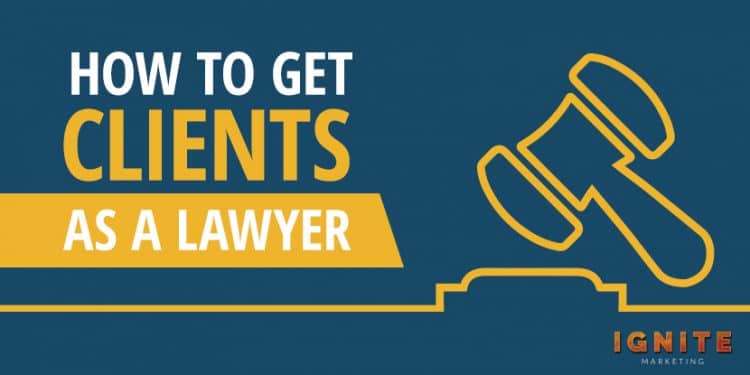


In today's post, we're going to be discussing how to get clients as a lawyer.
The tactics contained in this article have been used by many lawyers to gain valuable clients at a relatively low cost.
Some of these strategies will cost a bit more than others. However, the costlier methods tend to bring in clients more quickly, so it tends to even out.
Alright, let's get to it. Here are the best ways to get clients as a lawyer.
No matter what kind of lawyer you are, you need to get your rating on AVVO as high as possible.
While most businesses look to get reviews on Google or Yelp, many people who are looking for legal advice go to AVVO for guidance in selecting an attorney.

Unlike other review sites, AVVO doesn't base its rating solely on client reviews. It also takes many other factors into account.
Before you can take steps to raise your rating, you'll need to claim your account. Type your first and last name into the AVVO search bar. As long as you've passed the Bar exam, your name should appear in the search results. Claim your profile by using one of the following:
Once your profile has been claimed, AVVO will start you off with a base rating of 5.9. That's not terrible, but it certainly isn't going to impress any potential clients. To push your rating as high as you can, you can take the following steps:
If you're starting as a new lawyer, finding clients can be tough. No matter where you live, at least one established attorney is working in your legal niche. Beating them out and winning clients for yourself might require a bit of upfront help from your friends and family.
You don't need to ask anyone to hire you outright. Quite frankly, there's a solid chance no one will need your services at this point.
Just let them know that you're looking for new clients, and you would appreciate their keeping you in mind if anyone they know mentions they need a trustworthy attorney.
Running PPC ads on search engines like Google or Bing is the fastest way to bring in new clients.
While a persuasive ad linking to a professional landing page will drive qualified traffic to your website, you should know that running PPC ads for legal services is not cheap.
Landing a single client can bring in thousands of dollars, so other attorneys and law firms are willing to pay a lot of money to bring lawyer-seeking searchers to their websites.
That being said, it is possible to run a successful PPC ad campaign without breaking the bank. It'll require some savvy strategizing and a willingness to give up the most lucrative keywords, but it is doable, nonetheless.
If you want to bring in clients quickly without spending too much, use the following tips.
General keywords like "lawyer" or "attorney" are going to have a lot of competition. Instead of wasting your budget on these expensive high-funnel keywords, stick to more specific terms that target people who are more likely to convert.
If you're a personal injury lawyer in Reno, Nevada, you might want to target the following keywords:
These are just a few of the many long-tail, conversion-oriented keywords you can target. Just insert your legal niche and location, and you should be good to go.
I was recently listening to the Paid Search Podcast (a podcast run by a couple of Google Ads experts). In this episode, Jason (one of the experts) mentioned something interesting he learned while running an ad campaign for a personal injury lawyer.

As it turns out, some of the people searching for personal injury lawyers were using a term Jason hadn't thought of: "pain and suffering lawyer."
Jason added this keyword to the campaign, and it brought in a sizeable number of new clients.
Why am I mentioning this?
It's simple: getting creative with the keywords you target can help you find low-competition search phrases that the competition isn't targeting.
Think about all of the different phrases someone might use when searching for your services. There's no harm in running an ad for that phrase. The worst that happens is that it receives zero impressions and doesn't cost you any money.
Negative keywords clean up your keyword targeting and ensure your ads are only shown to people who are looking to hire a lawyer.
Here are a few keyword themes you should exclude in your ad campaign.
If you operate in a large metro area, it won't be enough to target your city. Creating ads for each zip code you operate in can help you build ultra-specific campaigns that increase your odds of getting clicks and conversions.
Some zip codes will also be worth more than others. Prioritize targeting zip codes with high population densities and high levels of income.
While it's easy to set your bid strategy to automatic and let Google do the work for you, handing control of the bidding to Google's algorithm isn't a budget-friendly decision.
Google doesn't care all that much about wasting your budget or spend. While many automatic bids are within a reasonable range, you'll almost certainly see a few high CPC prices that feel like a punch to the gut.
Setting manual maximum bids can limit your exposure to overpriced budget-draining bids. To change your bid type, use the following steps.
It's best to start small and slowly work your way up to your target bid range. While setting artificially low bids might cost you a few days' worth of ad clicks, it could save you thousands of dollars in ad spend throughout your campaign.

If you want more clients, you need to place yourself where your potential clients are hanging out. And almost all of them are hanging out on at least one of the major social media platforms.
There are many ways to find clients on every platform. However, I'm going to focus on the two many lawyers find the most success on: LinkedIn and Facebook.
You're going to have a hard time reaching people if you don't have a sizeable network.
Fortunately, LinkedIn makes it extremely easy to connect with anyone you want. A comprehensive search tool lets you find people using parameters like location, job title, company, and former school.
You don't need to limit yourself to people you know. If you reach out to someone you don't know with a message that says, "I'm looking to meet more people in [industry], and I'd love to connect with you," it can result in a bounty of lucrative connections.
Once you've connected with a fair amount of people, you need to get them interested in you. The best way to do this is by publishing useful content that gives a unique perspective on the issues they care about.
One of the nicest parts about publishing on LinkedIn is that you don't have to deal with the trouble that comes with designing and building your blog. As long as you've got some connections, you'll already have an audience for anything you post.
While you're free to write about anything you want, you'll get more clients if you stick to your area of law expertise. And even though it's necessary to rely on the opinions of others, you should feel comfortable with becoming a thought leader in your space.
As long as your posts are rooted in fact, many of your connections will come to respect your opinions and will look forward to the next time you post.
LinkedIn groups are internal communities built around specific locations, industries, and interests. The size of the group usually depends on how specific it is. For example, a group called "United States Lawyers" will have far more members than "Charleston Divorce Lawyers."
Look for groups that match your location and specialty. Once you join them, become an active member of the community. Answer questions thoughtfully and post questions of your own that you think the group can help you with.
If you can't find a group that matches your location and area of expertise, you can always make one yourself. Just know that if the group starts attracting members, you may find yourself with some unwanted extra admin responsibilities on your hands.
Unless you're willing to pay for ads, you'll need to build an audience to ensure your posts reach potential clients. The more likes you have on your Facebook page, the more people you'll be able to get your content in front of.
Before you attempt to get followers, you'll need a business page for them to follow. To start one, go to Facebook.com/business and click "Create a page" in the upper-righthand corner. Once you fill out all of the necessary information and add some profile and cover photos, you'll be good to go.
It's hard to get likes on your page when you have zero followers. Because no one can see your posts, no one can share them with their networks.

And unfortunately for new pages, people are less likely to follow if you don't already have a substantial number of followers.
This phenomenon is called social proof: the fewer followers you have, the less seriously people will take your page. If you want potential clients to take your page seriously from the get-go, you need to do a little groundwork to build up a follower base.
It's pretty easy to build social proof if you're willing to spend a bit of money on ads. By targeting lower-income countries, you can create an ad that generates likes for as little as $0.01 per like.
The followers you obtain with this method obviously won't be interested in hiring you. Most won't even engage with your content.
That's okay, though. You're only investing in these initial followers to build up social proof. The benefit will come down the road when the social proof you've built persuades potential clients to start following you.
Once you've got some social proof, you should start posting content that potential clients would find interesting.
If you run a blog or a YouTube channel, you likely already have some great content to share. But if you don't have any content of your own, no worries. Find content creators in your industry and share their best stuff.
I already mentioned Facebook ads in the context of building social proof.
Well, ads can also be used to get your service directly in front of your target market.
Here are a few ways you can use Facebook ads to bring potential clients to your website.
Although digital marketing can yield terrific results, you shouldn't overlook the power that client referrals can bring.
A single recommendation from a satisfied client can generate more revenue than thousands of dollars in ad spend.
And the best part? It's completely free.

While going above and beyond professionally for your clients should be enough to bring in referrals, this isn't always the case. You're more likely to get referrals if your clients like you as a person. And if you want your clients to enjoy the time they spend with you, you need to build relationships with them.
Here are a few ways to strengthen your relationships with your clients.
No matter how dire the client's situation may seem, it's important you always bring a positive attitude to every interaction. Confidence, positivity, and enthusiasm are personality traits that will make your clients think more favorably of you.
Positivity is important, but you shouldn't lie to your clients about the reality of the situation. Give your true and honest opinion on every aspect of the case. While your clients may not like the implications of your words, they will appreciate your honesty.
The client-attorney relationship is a professional one. You can be as jovial and agreeable as you want, but your clients will only like you if you deliver on your promises.
Be open with your clients by setting realistic expectations but do whatever you can to exceed those expectations. If you impress clients with the quality of your work, it will only add to their opinion of you as a person.
You must keep your clients in the loop as their case progresses. Provide regular status updates, and don't hesitate to reach out if something urgent comes up.
You should also make an effort to be available to your clients. Many will be entirely unfamiliar with the legal processes you're helping them navigate, and they'll need to be reassured that the money they're paying you isn't going to waste.
